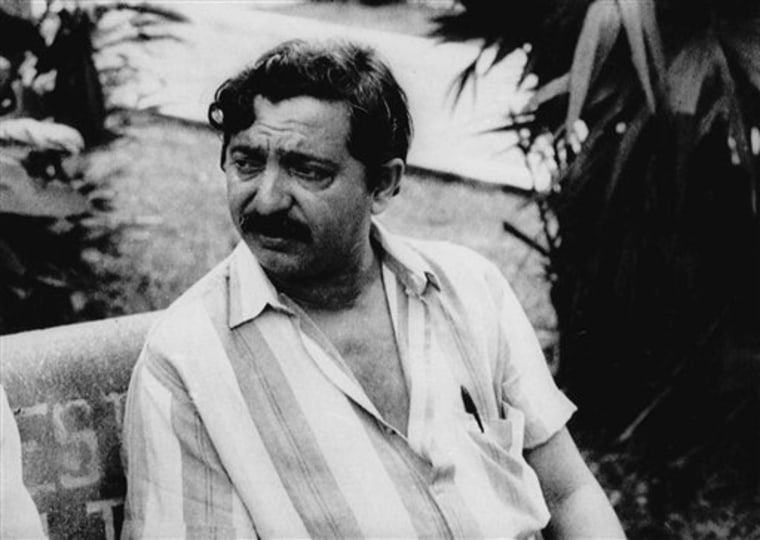The shotgun blast that tore through the chest of Chico Mendes made the Brazilian rubber tapper an environmental icon and his fight to save the Amazon a global crusade.
But the battle against clear-cutting in remote jungles hasn't gotten any safer in the 20 years since two gunmen hid in Mendes' backyard and patiently awaited their target.
More than 1,100 activists, small farmers, judges, priests and other rural workers have been killed in disputes over preserving land since Mendes' murder, according to the Catholic Land Pastoral, a watchdog group known as CPT.
Of those killings, fewer than 100 cases have gone to court. About 80 of the convicted were merely hired guns for powerful ranchers and loggers seeking to remove obstacles to expanding their lands, according to federal prosecutors and the CPT, founded by the Catholic church to fight violence and unequal land distribution.
None serving a sentence
About 15 of the masterminds were found guilty, but none is serving a sentence today.
"In the Amazon, deep in the forest, far away from the state, cities and institutions, you don't have anything," said Andre Muggiati, an Amazon campaigner for Greenpeace, who is based in the jungle city of Manaus. "Sometimes all you have is the power of a gun."
Mendes, who died on Dec. 22, 1988, was not the first rain forest defender murdered. But in death, he became the most famous.
An uneducated man who learned rubber tapping as a boy, he first organized a union to stop the destruction of rubber trees near his home in Xapuri, deep in jungle state of Acre. His crusade then expanded to Amazon preservation, working with U.S. environmental groups and then his own government to create reserves where people could make a living from the forest without destroying it.
His death made front-page news around the world and inspired a television movie in the U.S.
Local rancher Darly Alves da Silva and his son, Darci, who pulled the trigger, were sentenced to prison for killing Mendes, who tried to stop them from clearing forest land to graze cattle. They are now free after serving a third of their 19-year sentences.
At his capture, Darly Alves da Silva told a Brazilian newspaper: "There was no mystery about killing Chico Mendes. One day I told him that if I wanted to kill him, I'd kill him in the middle of the street. 'You're an easy man to kill,' I told him."
Lawlessness continues
The lawlessness continues, environmental activists say, illustrated in the 2005 murder of Dorothy Stang, a Catholic nun and Dayton, Ohio, native gunned down while fighting to protect land in Para state.
The gunman in her case is in prison. But the ranchers accused of ordering the act are free.
The conflict between developing and preserving the vast rain forest is constant as Brazil struggles to balance the health of the planet with its need to raise millions of its own people from poverty.
But the standoffs between environmentalists and farmers or loggers seeking to illegally clear land are very local affairs, and attempts to mete out justice get tangled in bureaucratic detail.
"Police are reluctant to investigate, reluctant to protect defenders when they are threatened. So the story continues," said Patrick Wilcken, a Brazil researcher for Amnesty International.
Felicio Pontes, a federal prosecutor in Para state for 12 years, noted that Brazil's legal system lets defendants appeal cases five times. Trials are delayed for years. Witnesses die. Evidence is lost.
"You never get a final judgment in Brazil," Pontes said. "At its quickest, each one of these appeals can take three years. The only people judged quickly and sent to prison are the poor; they don't have the money for lawyers."
Acts of self-defense?
Those convicted or suspected in the killings say they are acts of self-defense as the activists foment or engage in violence. Stang was accused of arms trafficking by her opponents.
Under local conspiracy theories, nonprofit Amazon groups are fronts for foreign nations that want to invade the region.
Loggers and farmers also say the issue of violence in the region is overblown.
"What exists are a few isolated cases that ended in conflict. You see a lot more violence in Rio and Sao Paulo," said Luiz Carlos Tremonte, one the top loggers in Para and a former head of an influential wood industry association.
Elenira Mendes, Chico's daughter, was just 4 years old when she watched her father bleed to death in the family's small home. She says the global attention devoted to his killing resulted in concrete changes in Acre state, which now registers the lowest rate of activist killings in the Amazon region, according to the CPT.
"The world was looking at Xapuri because my dad was a great leader before he was brutally murdered," Mendes said. "So there was less of a chance for this impunity to continue here."
Amazon destruction continues
Meanwhile, Mendes' associates went on to win the governorship of the state and other elected posts. A fellow union organizer, Luiz Inacio Lula da Silva, is now Brazil's president. A tree tapper's daughter from Acre — Marina Silva — was Brazil's environment minister until last spring.
But Amazon destruction continues. The government' new mapping system shows a 66 percent increase in areas partially destroyed in 2008 compared to 2007.
Stang's brother, David, says it is bewildering that the slayings still go unpunished. He recently accepted the U.N. Prize in the Field of Human Rights for his sister, who spent more than three decades working for the rights of the poor in the Amazon.
Using one of her nicknames, he said: "What does this impunity do for the poor there? Do you think they are not afraid of these people who can even kill the 'Angel of the Amazon' and get away with it?"
